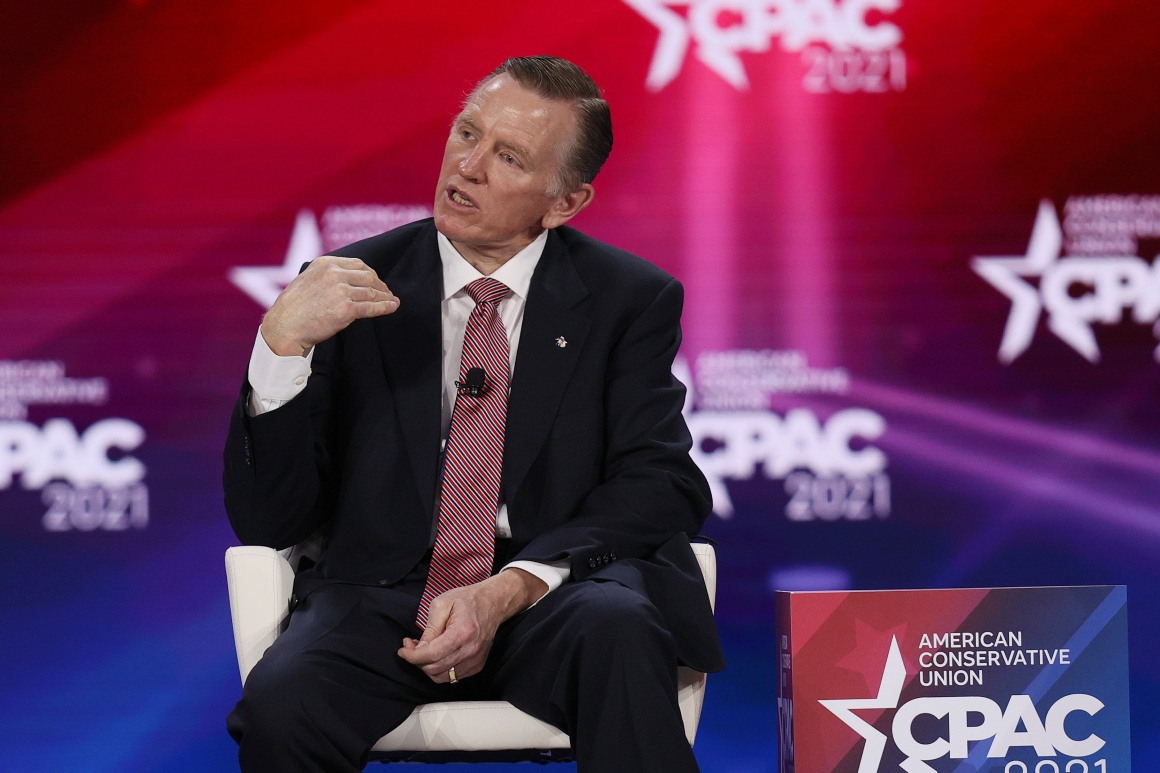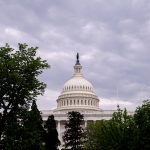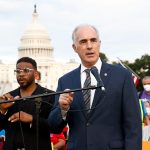The House GOP’s No. 3 leader recently urged Republicans to make clear they’re not the party of white supremacy. Two days later, one of their members spoke at a conference organized by a known white nationalist.
The whiplash between Rep. Liz Cheney’s (R-Wyo.) plea and Rep. Paul Gosar’s (R-Ariz.) public speech underscores just how tough it is for GOP leaders to rein in members who cater to the extreme wings of the party. As Republicans increasingly grapple with how — or even whether — to exorcise the most radical elements from their party, their leaders’ jobs won’t get any easier.
The House GOP has so far confronted no large-scale blowback from Gosar’s speech to the America First Political Action Conference, or from other incidents that link a few of its members to far-right imagery or rhetoric.
But some fear that if the conference — which just ushered in a historically diverse freshman class — doesn’t stomp out those political brush fires now, there’s a risk they will spread and engulf the party. Democrats are already trying to make QAnon, the far-reaching conspiracy theory labeled as a domestic terrorism threat by the FBI, the face of the GOP ahead of the midterms.
“I think the organization that [Gosar] spoke to is one that has expressed views that are clearly racist … This is not the kind of an organization or an event that other members of Congress should be participating in,” said Cheney, the House GOP Conference chair who voted to impeach former President Donald Trump.
“I’ve been very clear about the extent to which we have to stand against white supremacists, stand against anti-Semitism,” added Cheney. “And that should not be part of our public discourse.”
House Minority Leader Kevin McCarthy and Minority Whip Steve Scalise, the top two GOP leaders, have been silent on Gosar thus far, though both have condemned racism and bigotry in all forms. Said McCarthy spokesperson Mark Bednar: "There is absolutely no place for racism in our discourse or society."
Other Republicans privately said they were disturbed by Gosar’s appearance at the white nationalist conference and are concerned that it tacitly signals the embrace of extremist groups that have no place in the GOP. Only some were publicly willing to call out Gosar’s attendance at the event.
“From what I understand of what AFPAC is and what it stands for, it is unbecoming of a member of Congress to speak or attend the conference,” said Rep. Jim Banks (R-Ind.), the head of the Republican Study Committee, the largest caucus in the House GOP conference.
The episode comes as most Republicans also voted, but failed, to keep freshman Rep. Marjorie Taylor Greene (R-Ga.) in her committee assignments after she circulated conspiracy theories and endorsed social media posts calling for violence against Democrats.
Now, Republicans are questioning whether the embrace of far-right groups by federal lawmakers is giving power to organizations that had previously been stifled on the national stage.
“It’s always been lurking in the shadows. And then they have a convention. … It is completely nuts,” one GOP lawmaker said of the AFPAC event, where organizer Nick Fuentes called for protection of “the white demographic core” and pushed other racist rhetoric.
“It’s really disgusting, nefarious stuff," this Republican lawmaker added. "And this is the stuff you have to just actively beat back.”
The GOP’s rightward drift toward extremism has been years in the making, but the violent insurrection on Jan. 6 — when white supremacists, Holocaust deniers and QAnon believers stormed the Capitol to stop Congress from certifying Joe Biden’s win — has only amplified a bitter internal debate about the direction of the party.
Democrats argue that moves like Gosar’s speech prove that extremists are winning the battle for the GOP’s soul.
“The idea that a sitting member of Congress would go and show his support and solidarity for racist white nationalists is an outrage,” said Rep. Jamie Raskin (D-Md.), the lead impeachment manager during Trump’s second impeachment trial, which ended in his acquittal of inciting the Jan. 6 attack.
“But it is a terrible statement about the moral deterioration of the Republican Party. I would hope that the Republican caucus would immediately take action against members who are consorting with white nationalists,” he added.
That’s not to say House Republican leaders haven’t vocally condemned white supremacy, anti-Semitism and other racist beliefs. Gosar himself denounced “white racism” and later tried to distance himself from AFPAC. But the Arizonan also told the Washington Post that he was seeking to cultivate relationships with new voters.
GOP leaders have dismissed accusations that Republicans are increasingly tolerant of far-right ideologies in an effort to not alienate voters, particularly those brought to into the party’s fold under Trump.
Yet the former president has winked at the QAnon movement and refused to denounce white nationalist groups like the Proud Boys during the first presidential debate last year. Instead, Trump said the Proud Boys should “stand back and stand by,” which the group has turned into a slogan. He also said there were "very fine people on both sides" of the 2017 white supremacist rally in Charlottesville, Va.
“I think most people are going out of their way to distance themselves from the extremists,” said another GOP lawmaker. “But some people are embracing it. And other people may be not paying enough attention to what they’re doing.”
“We all need to pay more attention to the things we say and do, and where we say and do them,” this Republican lawmaker added.
McCarthy (R-Calif.), who wants to unite the party in his drive to win back the House, has recently claimed to not know what QAnon is and routinely mispronounces its name. He also did little to stop Greene from winning her runoff race even after POLITICO uncovered a string of racist, anti-Semitic and Islamophobic Facebook videos she made.
And Scalise (R-La.), who survived a 2017 assassination attempt when a radicalized left-wing gunman opened fire on GOP members playing baseball, has called out Democrats for failing to condemn violence during Black Lives Matter protests over the summer that responded to police brutality against unarmed Black people.
“We’ve been very vocal speaking out against white supremacy, any kind of bigotry, or hatred,” Scalise said. “I think it’s important that you call it out wherever you see it. Not only on the opposite side of the aisle, but on your own.”
But Senate Minority Leader Mitch McConnell (R-Ky.) has gone further, making clear that far-right extremists such as Greene have no place in the party. “Loony lies and conspiracy theories are cancer for the Republican Party and our country,” McConnell said last month.
This year isn’t the first time House GOP leaders have faced problematic right-wing members in their ranks. Former Rep. Steve King (R-Iowa) — who also spoke at AFPAC last week — espoused white nationalist views and other controversial beliefs during his time in office, but it took years for Republican leaders to punish him by kicking him off his committees. When King finally lost his primary in 2020, party leaders sighed with relief.
Today there is a growing cohort of members who could create King-like headaches for GOP leaders. Aside from Greene and Gosar, freshman Rep. Lauren Boebert (R-Colo.) has associated with far-right gun groups; freshman Rep. Madison Cawthorn (R-N.C.) has faced scrutiny for past social media posts about Adolf Hitler, which he later said were a mistake; and Reps. Andy Biggs (R-Ariz.) and Mo Brooks (R-Ala.) were ringleaders of the effort to challenge the election certification in Congress.
Investigators are looking into what role, if any, lawmakers played in the Jan. 6 riots. Boebert has been criticized for live-tweeting Speaker Nancy Pelosi’s whereabouts during the siege; she also denied giving Capitol tours to anyone other than her family ahead of the riots.
Notably, Republicans’ internal discussions over how to handle far-right ideology come as they criticize Democrats for failing to loudly denounce some of their own members’ controversial remarks — particularly Rep. Ilhan Omar (D-Minn.), whose comments on Israel were met with a resolution from her party denouncing hate speech.
“In our political discourse, there are things that should be beyond the bounds,” said Rep. Patrick McHenry (R-N.C.). "And ideology of hate is beyond the bounds, whether it’s on the left or the right."




















